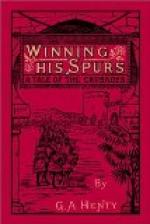Cuthbert looked round to observe the exact position in which he was standing. He knew, of course, every foot of the castle, and saw that but a short distance behind a single row of armed men was the staircase leading to the battlements.
“False and perjured knight,” he said, taking a step forward, “I may die; but I would rather a thousand deaths than such a life as yours will be when this deed is known in England. But I am not yet dead. For myself, I could pardon you; but for the outrage to my mother—” and with a sudden movement he struck Sir Rudolph in the face with all his strength, with his mailed hand.
With the blood gushing from his nostrils, the knight fell backwards, and Sir Cuthbert, with a bound, before the assembly could recover from their astonishment at the deed, burst through the line of men-at-arms, and sprang up the narrow staircase. A score of men-at-arms started in pursuit; but Sir Cuthbert gained the battlements first, and without a moment’s hesitation sprang upon them and plunged forward, falling into the moat fifty feet below. Here he would have perished miserably, for in his heavy armour he was of course unable to swim a stroke, and his weight took him at once into the mud of the moat. At its margin, however, Cnut stood awaiting him, with one end of the rope in his hand. In an instant he plunged in, and diving to the bottom, grasped Cuthbert by the body, and twisted the rope round him. The two archers on the bank at once hauled upon it, and in a minute Sir Cuthbert was dragged to the bank.
By this time a crowd of men-at-arms appeared upon the battlements. But as they did so the archers opened a storm of arrows upon them, and quickly compelled them to find shelter. Carried by Cnut and the men with him—for he was insensible—Sir Cuthbert was quickly conveyed to the centre of the outlaws, and these at once in a compact body began their retreat to the wood. Cuthbert quickly recovered consciousness, and was soon able to walk. As he did so, the gates of the castle were thrown open, and a crowd of men-at-arms, consisting of the retainers of the castle and the mercenaries of Prince John, sallied forth. So soon as Cuthbert was able to move, the archers started at a brisk run, several of them carrying Cuthbert’s casque and sword, and others assisting him to hurry along. The rear ranks turned as they ran and discharged flights of arrows at the enemy, who, more heavily armed and weighted, gained but slowly upon them.
Had not Sir Rudolph been stunned by the blow dealt him by Cuthbert, he would himself have headed the pursuit, and in that case the foresters would have had to fight hard to make their retreat to their fastness. The officer in command of the mercenaries, however, had no great stomach for the matter. Men were hard to get, and Prince John would not have been pleased to hear that a number of the men whom he had brought with such expense from foreign parts had been killed in a petty fray. Therefore after following for a short time he called them off, and the archers fell back into the forest.




